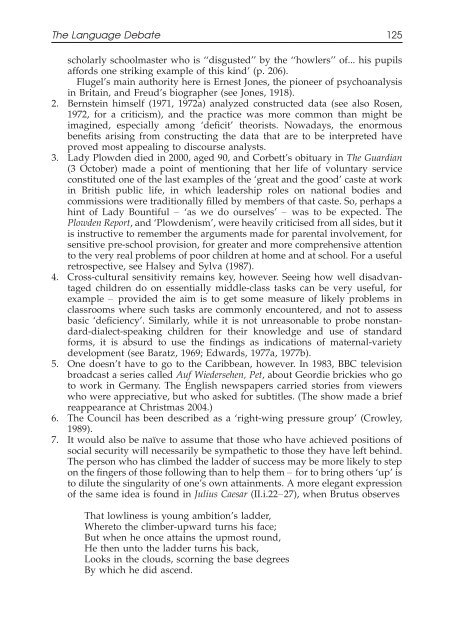Language Diversity in the Classroom - ymerleksi - home
Language Diversity in the Classroom - ymerleksi - home
Language Diversity in the Classroom - ymerleksi - home
- No tags were found...
You also want an ePaper? Increase the reach of your titles
YUMPU automatically turns print PDFs into web optimized ePapers that Google loves.
The <strong>Language</strong> Debate 125scholarly schoolmaster who is ‘‘disgusted’’ by <strong>the</strong> ‘‘howlers’’ of... his pupilsaffords one strik<strong>in</strong>g example of this k<strong>in</strong>d’ (p. 206).Flugel’s ma<strong>in</strong> authority here is Ernest Jones, <strong>the</strong> pioneer of psychoanalysis<strong>in</strong> Brita<strong>in</strong>, and Freud’s biographer (see Jones, 1918).2. Bernste<strong>in</strong> himself (1971, 1972a) analyzed constructed data (see also Rosen,1972, for a criticism), and <strong>the</strong> practice was more common than might beimag<strong>in</strong>ed, especially among ‘deficit’ <strong>the</strong>orists. Nowadays, <strong>the</strong> enormousbenefits aris<strong>in</strong>g from construct<strong>in</strong>g <strong>the</strong> data that are to be <strong>in</strong>terpreted haveproved most appeal<strong>in</strong>g to discourse analysts.3. Lady Plowden died <strong>in</strong> 2000, aged 90, and Corbett’s obituary <strong>in</strong> The Guardian(3 October) made a po<strong>in</strong>t of mention<strong>in</strong>g that her life of voluntary serviceconstituted one of <strong>the</strong> last examples of <strong>the</strong> ‘great and <strong>the</strong> good’ caste at work<strong>in</strong> British public life, <strong>in</strong> which leadership roles on national bodies andcommissions were traditionally filled by members of that caste. So, perhaps ah<strong>in</strong>t of Lady Bountiful ‘as we do ourselves’ was to be expected. ThePlowden Report, and ‘Plowdenism’, were heavily criticised from all sides, but itis <strong>in</strong>structive to remember <strong>the</strong> arguments made for parental <strong>in</strong>volvement, forsensitive pre-school provision, for greater and more comprehensive attentionto <strong>the</strong> very real problems of poor children at <strong>home</strong> and at school. For a usefulretrospective, see Halsey and Sylva (1987).4. Cross-cultural sensitivity rema<strong>in</strong>s key, however. See<strong>in</strong>g how well disadvantagedchildren do on essentially middle-class tasks can be very useful, forexample provided <strong>the</strong> aim is to get some measure of likely problems <strong>in</strong>classrooms where such tasks are commonly encountered, and not to assessbasic ‘deficiency’. Similarly, while it is not unreasonable to probe nonstandard-dialect-speak<strong>in</strong>gchildren for <strong>the</strong>ir knowledge and use of standardforms, it is absurd to use <strong>the</strong> f<strong>in</strong>d<strong>in</strong>gs as <strong>in</strong>dications of maternal-varietydevelopment (see Baratz, 1969; Edwards, 1977a, 1977b).5. One doesn’t have to go to <strong>the</strong> Caribbean, however. In 1983, BBC televisionbroadcast a series called Auf Wiedersehen, Pet, about Geordie brickies who goto work <strong>in</strong> Germany. The English newspapers carried stories from viewerswho were appreciative, but who asked for subtitles. (The show made a briefreappearance at Christmas 2004.)6. The Council has been described as a ‘right-w<strong>in</strong>g pressure group’ (Crowley,1989).7. It would also be naïve to assume that those who have achieved positions ofsocial security will necessarily be sympa<strong>the</strong>tic to those <strong>the</strong>y have left beh<strong>in</strong>d.The person who has climbed <strong>the</strong> ladder of success may be more likely to stepon <strong>the</strong> f<strong>in</strong>gers of those follow<strong>in</strong>g than to help <strong>the</strong>m for to br<strong>in</strong>g o<strong>the</strong>rs ‘up’ isto dilute <strong>the</strong> s<strong>in</strong>gularity of one’s own atta<strong>in</strong>ments. A more elegant expressionof <strong>the</strong> same idea is found <strong>in</strong> Julius Caesar (II.i.2227), when Brutus observesThat lowl<strong>in</strong>ess is young ambition’s ladder,Whereto <strong>the</strong> climber-upward turns his face;But when he once atta<strong>in</strong>s <strong>the</strong> upmost round,He <strong>the</strong>n unto <strong>the</strong> ladder turns his back,Looks <strong>in</strong> <strong>the</strong> clouds, scorn<strong>in</strong>g <strong>the</strong> base degreesBy which he did ascend.
















